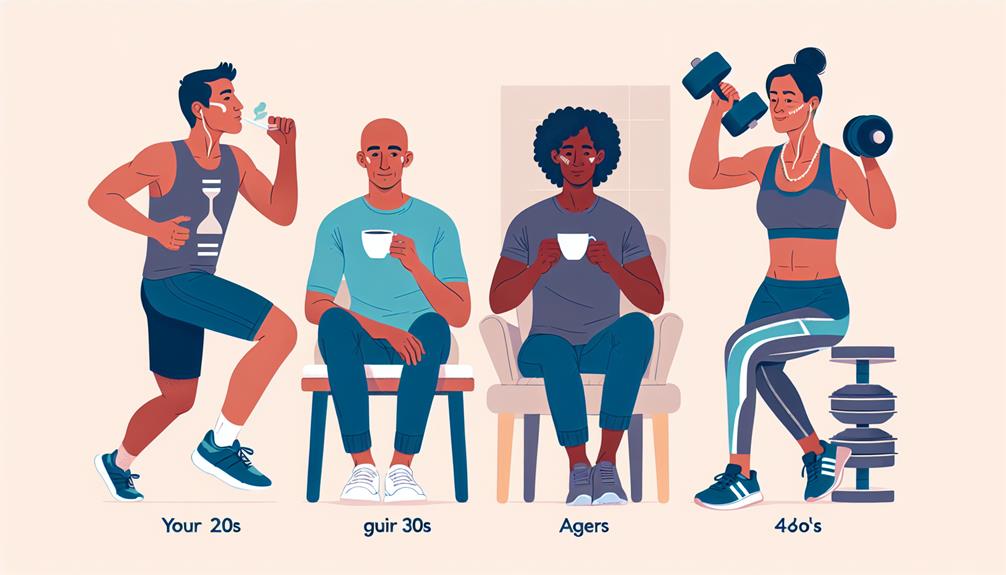BMR Calculator
Calculating your Basal Metabolic Rate (BMR) is like having a blueprint of your body's energy engine. Have you ever wondered how many calories your body needs to function at rest? Understanding your BMR can provide essential insights into your daily energy requirements. By uncovering the factors that influence your BMR, you can tailor your nutrition and fitness strategies more effectively. But how exactly do you calculate your BMR, and how can this knowledge be applied to optimize your lifestyle choices?
Key Takeaways
- BMR determines daily energy needs at rest.
- Tailoring calories based on BMR supports effective weight management.
- Factors like age, weight, and gender influence BMR.
- Understanding BMR guides personalized nutrition and fitness plans.
Understanding Basal Metabolic Rate (BMR)
Understanding Basal Metabolic Rate (BMR) requires recognizing that it represents the energy your body needs at rest to maintain vital functions. Many misconceptions surround BMR, with one common fallacy being that a lower BMR is always better for weight loss. In reality, having a higher BMR means your body burns more calories even at rest, which can aid in weight loss efforts.
Your BMR is influenced by various factors such as age, gender, weight, height, and body composition. Contrary to popular belief, weight loss should not solely focus on lowering BMR but rather on creating a calorie deficit through a combination of diet and exercise. By understanding your BMR, you can better tailor your weight loss plan to meet your specific needs. Remember, while BMR plays a role in weight management, it is just one piece of the puzzle. It is essential to adopt a holistic approach that considers overall health and lifestyle factors when aiming for sustainable weight loss.
Importance of BMR Calculation
To grasp the significance of BMR calculation, it is essential to recognize how it serves as a fundamental factor in determining your body's baseline energy requirements for vital functions. Your Basal Metabolic Rate (BMR) represents the minimum amount of energy needed to sustain essential physiological functions at rest. Understanding your BMR is crucial for effective weight management and optimizing energy expenditure.
Calculating your BMR provides a precise estimation of the calories your body requires to maintain basic functions such as breathing, circulation, and cell production. By knowing your BMR, you can tailor your calorie intake to support your metabolism effectively. If you consume fewer calories than your BMR, weight loss may occur, whereas exceeding this limit can lead to weight gain.
Moreover, your BMR forms the foundation for determining your Total Daily Energy Expenditure (TDEE), which accounts for physical activity and exercise. By factoring in your BMR, you can create a personalized nutrition and fitness plan to achieve your weight management goals efficiently. Therefore, calculating your BMR is a critical step in understanding and managing your energy needs.
Factors Influencing BMR

Several key factors influence your Basal Metabolic Rate (BMR), impacting the baseline energy requirements for your body's vital functions.
- Dietary habits: The types of food you consume and the frequency of your meals play a significant role in determining your BMR. For example, a diet rich in protein can slightly increase your BMR due to the thermic effect of food, where energy is expended during digestion.
- Genetics and BMR: Your genetic makeup can influence your BMR to some extent. Factors such as your body composition, hormone levels, and metabolic efficiency are partially determined by your genes, which can affect how efficiently your body burns calories at rest.
- Physical activity level: Regular physical activity can elevate your BMR by increasing muscle mass and improving metabolic efficiency. Engaging in strength training or aerobic exercises can have a positive impact on your BMR by boosting your overall energy expenditure even when at rest.
How to Calculate Your BMR
How can you accurately calculate your Basal Metabolic Rate (BMR) to understand your daily energy needs? Calculating your BMR is essential for determining the number of calories your body needs at rest. There are various formula variations to calculate BMR, such as the Harris-Benedict equation or the Mifflin-St Jeor equation. These formulas take into account factors like age, weight, height, and gender to provide a more accurate estimation of your BMR. Additionally, tracking methods like using wearable devices or online calculators can help you monitor changes in your BMR over time.
To simplify the process, here is a comparison table of the two most commonly used BMR formulas:
| BMR Formula | Calculation Method |
|---|---|
| Harris-Benedict | Based on age, weight, height, and gender. |
| Mifflin-St Jeor | More recent formula with similar inputs. |
Applying BMR to Your Lifestyle

Calculating your Basal Metabolic Rate provides a foundational understanding for tailoring your daily energy intake to support your lifestyle and health goals.
- Meal Planning: Utilize your BMR to determine the number of calories needed to maintain, lose, or gain weight. Plan balanced meals that meet your energy requirements while providing essential nutrients for optimal health.
- Exercise Routines: Incorporate your BMR into your exercise regimen. Understanding your energy needs can help you fuel your workouts effectively, ensuring you have enough energy to perform while also supporting recovery.
- Healthy Lifestyle Choices: Use your BMR as a guide for making informed decisions about your overall lifestyle. Balancing your energy intake with expenditure can help you achieve and maintain a healthy weight, improve fitness levels, and support overall well-being.
Frequently Asked Questions
Can BMR Be Affected by Certain Medical Conditions or Medications?
Certain medical conditions or medications can affect your BMR. Hormonal imbalances and chronic illnesses may lower it, while weight loss and medication side effects could elevate it. Understanding these factors can help manage your daily energy needs.
Is It Possible to Have a BMR That Is Higher or Lower Than the Average Range?
Yes, it is possible to have a basal metabolic rate (BMR) that deviates from the average due to genetic factors, lifestyle choices, environmental influences, and weight fluctuations. These variables impact how efficiently your body burns calories.
How Does Age Play a Role in Determining Bmr?
As you age, changes in hormone levels can impact your BMR. Hormones play a vital role in regulating metabolism. Age-related decreases in muscle mass and activity levels can also contribute to a slower metabolic rate.
Are There Any Specific Diets or Foods That Can Help Boost Metabolism and Increase Bmr?
Imagine your body as a high-performance car. Metabolism boosting supplements act like premium fuel, enhancing efficiency. Superfoods for BMR are like fine-tuning your engine, optimizing performance. Incorporating these can help increase metabolism and boost BMR.
Can Regular Exercise Impact BMR and if So, How Much Should One Exercise to See a Significant Difference?
Regular exercise, through its frequency and intensity, can significantly impact your metabolism. To see a notable difference, aim for a mix of cardio and strength training sessions at least 3-5 times per week, each lasting around 30-60 minutes.
Conclusion
In conclusion, knowing your Basal Metabolic Rate (BMR) is crucial in understanding your daily energy needs. By calculating your BMR, you can tailor your diet and exercise routine to optimize your overall health and fitness goals. Consider the factors influencing your BMR and apply this knowledge to make informed decisions about your lifestyle. Harness the power of knowledge to fuel your body efficiently and reach your desired outcomes. Let science guide you on your journey to a healthier you.











